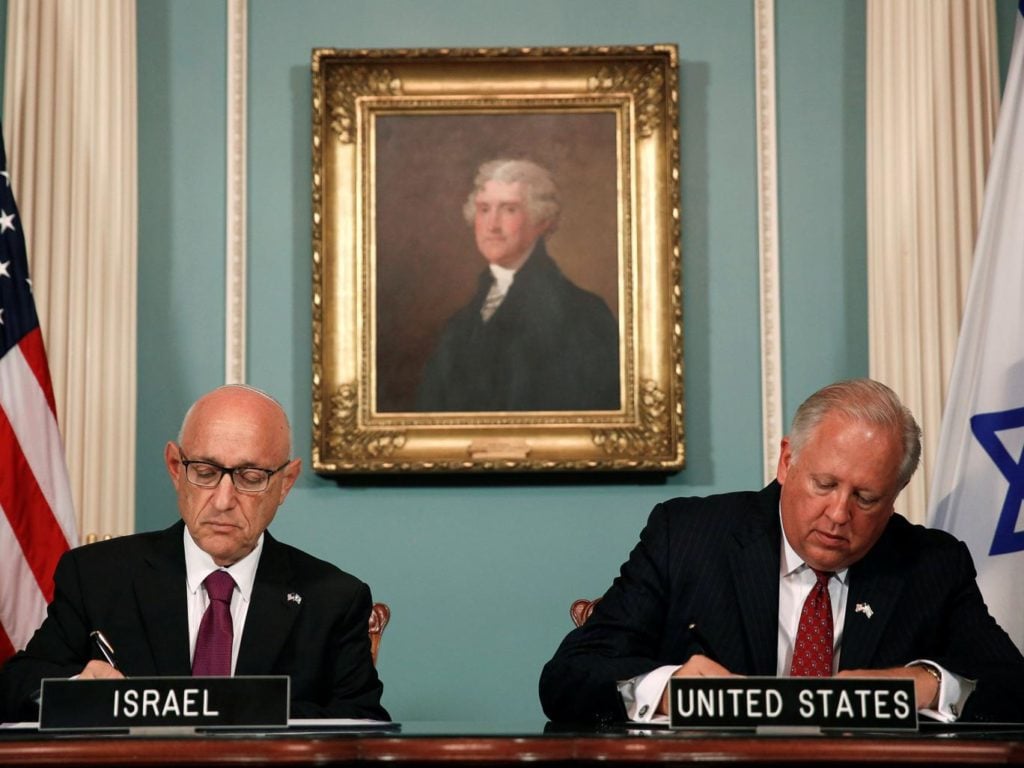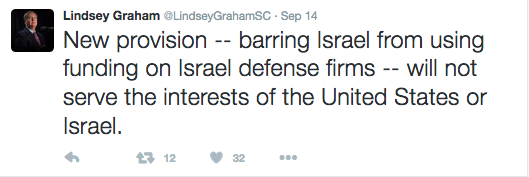
U.S. and Israeli representatives signed a memorandum of understanding in Washington on September 14. (Reuters)
This week, Israel and the US signed a $38 billion military aid package, the largest of its kind in U.S. history.
The two allies signed a Memorandum of Understanding (MOU) that will cover fiscal years 2019-2028, taking over when the current $30 billion MOU, signed in 2007, expires.
President Obama stated: “Prime Minister Netanyahu and I are confident that the new MOU will make a significant contribution to Israel’s security in what remains a dangerous neighborhood.”
Because it involves money and military aid going to Israel, it is controversial. But not for the normal reasons. Many in Israel, including former Prime Minister Ehud Barak, former Defense Minister Moshe Ya’alon and former head of IDF military intelligence Amos Yadlin, believe that Israel should have received additional funds from the U.S.
Netanyahu and former Ambassador to the U.S. and current Deputy Minister for Diplomacy Michael Oren have both told critics of the deal that they are being ungrateful.
Netanyahu said critics of the deal were “showing ingratitude… to our greatest and best friend, the United States.”
“There are those who when they hear the discourse here are likely to recall well-known depictions and libels against the Jews. Put yourself in the place of the Americans and ask yourself how the debate here sounds in the USA. We received a very good and very respectable package. We should say, ‘Thank you very much,’ and keep our mouths shut. Instead, it sounds like the Israelis got nearly $40 billion but there are still all kinds of people who are claiming, ‘We could have got more out of the Americans and got more money.’ This public debate is damaging to us. We look like people who don’t recognize a favor.”
It is bizarre, on so many levels, that Netanyahu and Oren are outright defending President Obama for giving Israel massive amounts of aid. If nothing else, these two Israeli leaders haven’t always been so appreciative of President Obama’s attitude towards Israel and the Middle East.
A few recent highlights of their contentious relationship:
While these two men might be right about the deal that Israel accepted, they are also imperfect defenders of it. Senior Labor Party MK Shelly Yachimovich said as much when she sarcastically tweeted: “The funniest thing is that Netanyahu is sternly rebuking his critics on the failures of the aid agreement over their ‘ingratitude’ toward the Americans. Teach us more, prime minister.”
None of the above is particularly shocking. After all, all politics is local, everyone in power has a short memory and as with any political establishment, the parties approach each other with a zero-sum attitude.
Here is the part that did shock me. While he did not necessarily agree with anyone in Israel, and he certainly does not agree with the President, South Carolina Senator Lindsey Graham is furious at Netanyahu for accepting the deal.
He blasted Netanyahu for “pulling the rug” from under Israel’s friends in Congress.
The gist of Graham’s objection is this: no one can protect Israel except for the U.S. Congress. And now Netanyahu signed a massive deal with President Obama making it impossible for Congress to continue to defend Israel.
This anger stems from the fact that, under the MOU, Israel is no longer permitted to solicit or accept additional funding from Congress. Graham’s take: “I don’t think it’s appropriate to have an agreement which shuts the next president and the next Congress out. I don’t think that it’s appropriate to have an agreement which shuts out me out and my colleagues.” He continued, “at the end of the day, I would tell our friends in Israel: Congress is your friend. Don’t pull the rug from under us.”
Graham is basically furious that Israel is making decisions relating to its own security, which sounds like the very type of right that we would normally hear him passionately defending.
But strangely that is not the full extent of his argument. He went on a tweet storm, which is not something he often does.
[Quick note: The other primary component of the MOU angering Graham is that Israel will no longer be permitted to appropriate US aid money to its own defense industry and will have to funnel that money back into American-made weapons.]






He seems to be upset not just that Israel will lack the agency to do anything it wants with the funding, but rather that the U.S. is going to be missing out on “Israeli advancements” that help to protect “Americans wearing the uniform of our nation.”
Think about that. The U.S. can still work with Israel, fund their military programs, and procure new technology and innovations stemming from Israel. But Graham is upset that this agreement ends the prior arrangement allowing Israel to spend part of the aid purchasing directly from Israeli companies (which would directly benefit the U.S. due to the required information sharing stipulated by the previous agreement).
What does this say about Graham, who is rarely met a conflict he did not think could be solved with American boots on the ground, and his trust in the American military program? He seems to literally be saying the only way America can protect our troops is through Israeli innovation.
Israel has pioneered numerous military advancements that the U.S. is smart to utilize. But let’s not pretend that the U.S. has not done well in this category itself.
If this analysis sounds hyperbolic, I refer you back to his final tweet: “I do fear it will be Americans wearing the uniform of our nation who will pay the price for this short-sighted change in policy.”
Chemi Shalev does an excellent job in Haaretz of laying out how this deal could have better negotiated by an Israel ally who had not spent the last eight years undermining his American counterpart. It is worth a read.
Follow me on Twitter @jlemonsk.